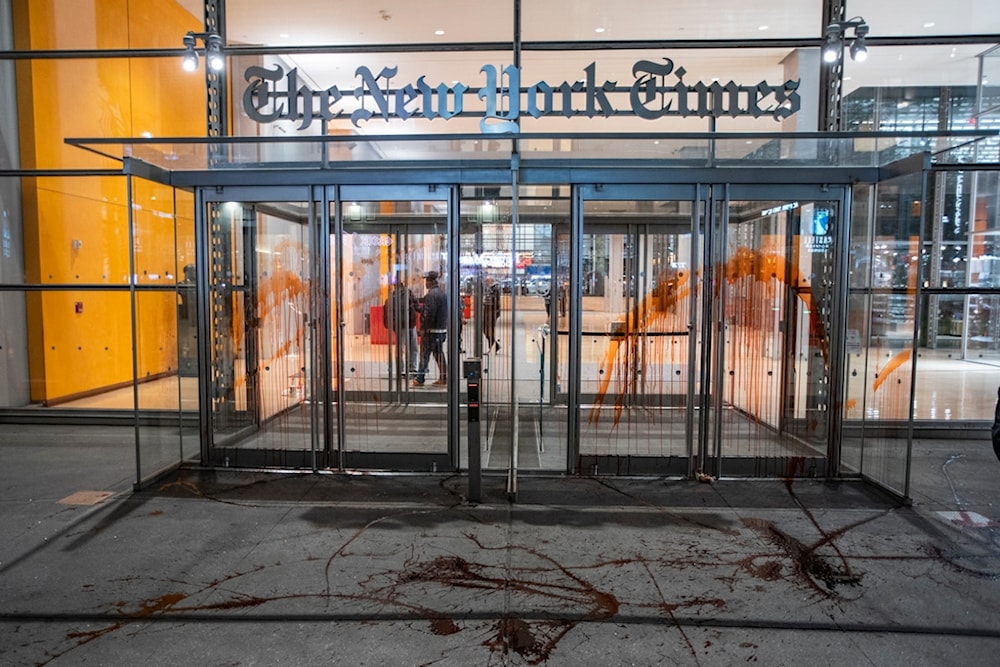NYT Gaza Memo tells staff to avoid the word 'genocide': The Intercept
The guidance does not characterize "Israel's" attacks on Palestinian civilians as "terrorism" and encourages journalists to press for 'specifics' or 'provide proper context' when accusations of "ethnic cleansing" are made.
-

Photo shows The New York Times building entrance after being vandalized with red tint by Pro-Palestinian demonstrators as they march calling for a ceasefire in Gaza, November 10, 2023, in New York. (AP)
A report by The Intercept on Monday detailed the contents of an internal memo issued by The New York Times instructing journalists covering "Israel's" war on Gaza to restrict the use of terms like "genocide" and "ethnic cleansing" and to avoid using "occupied territory" when describing Palestinian land.
The memo also advises against using the word "Palestine" except in rare cases and suggests avoiding the term "refugee camps" for areas in Gaza settled by forcefully displaced Palestinians.
While the memo claims to be contributing to journalistic objectivity, some staffers say they view it as showing deference to Zionist narratives.
"I think it’s the kind of thing that looks professional and logical if you have no knowledge of the historical context of the Palestinian-Israeli conflict," said a Times newsroom source who requested anonymity. "But if you do know, it will be clear how apologetic it is to Israel."
NYT first issued style guidance to journalists in November, with the aim of enhancing an alleged accuracy and consistency in covering the war on Gaza.
According to The Intercept, the relevance of this guidance lies in that it offers insight into the Zionist leanings of NYT international editors.
Other internal rifts at the NYT have included disputes over investigative reporting on systematic sexual violence, particularly after it was revealed that the news company fabricated allegations of rape by Resistance fighters on Israeli captives.
Whatsapp quarrels
Tensions arose within NYT's newsroom following the October 7 events and "Israel's" genocidal campaign in Gaza, with some staff members criticizing the paper for clearly favoring "Israel's" narrative and lacking consistent coverage standards.
According to The Intercept, debates particularly intensified on internal Slack and WhatsApp groups, prompting intervention from the international editor, Philip Pan, who urged better communication and discouraged using these channels for raising coverage concerns.
Topics of debate included Israeli aggressions on Al-Shifa Hospital, Palestinian civilian casualties, evidence of genocidal conduct by "Israel", and President Biden's promotion of unverified Israeli regime claims.
The debates surrounding coverage standards have attracted significant public attention. While setting style guidelines is common for news organizations, some sources within NYT's newsroom suggest that unique standards are applied to violence involving "Israel." This has led to frustration among readers, according to the sources.
Read more: Tensions erupt at NYT over debunk of Hamas sexual violence lies
The memo also provides guidance on language use and cautions against using inflammatory terms, while stressing "clarity" and "accuracy" in reporting.
But critics argue that such language has been disproportionately used to describe resistance attacks against Israelis by Palestinians, rather than Israeli actions against Palestinians.
An analysis by The Intercept found that terms like "slaughter," "massacre," and "horrific" were predominantly used to describe Israeli deaths, with minimal usage for Palestinian deaths.
As of November 24, the New York Times had described Israeli deaths as a "massacre" 53 times compared to just once for Palestinians.
The current death toll of Palestinian civilians exceeds 30,000, with thousands of others injured. Many experts say that the figures provided by Gaza's Ministry of Health are actually undercounts due to hundreds of people being missing under the rubble.
Memo sparks debate
The NYT memo further addresses contentious language surrounding the war on Gaza, including the use of terms like "terrorism" and "terrorist".
It advises using "terrorism" to describe attacks targeting civilians but cautions against labeling every reference to the October 7 events as a "terrorist attack".
The memo suggests varying language and terms to describe such incidents. It also cautions writers with regard to the usage of highly sensitive terms like "genocide" and "ethnic cleansing".
The guidance also does not characterize "Israel's" attacks on Palestinian civilians as "terrorism" and encourages journalists to press for specifics or provide 'proper context' when accusations of "ethnic cleansing" are made.
Read more: How language used in American media facilitates genocide
Against International Law
Elsewhere in the report, The Intercept says that the NYT guidelines deviate from established international norms on key issues related to the Israeli occupation of Palestine.
The memo prohibits the use of terms like "Palestine" in datelines or routine text, aligning with guidelines similar to the Associated Press Stylebook.
It also warns against using the term "refugee camps" to describe settlements in Gaza, instead suggesting terms like "neighborhoods" or "areas".
This contradicts the United Nations' recognition of these areas as refugee camps and their historical significance dating back to the Nakba in 1948.
Regarding the use of "occupied territories", the memo suggests avoiding the term and opting for specific references like "Gaza" or "the West Bank."
However, this contradicts the UN's classification of Gaza, the West Bank, and East Al-Quds as occupied Palestinian territories.
Critics argue that avoiding the term "occupied territories" obscures the reality of Palestinian livelihoods and feeds into narratives that downplay the significance of the occupation.

 5 Min Read
5 Min Read








